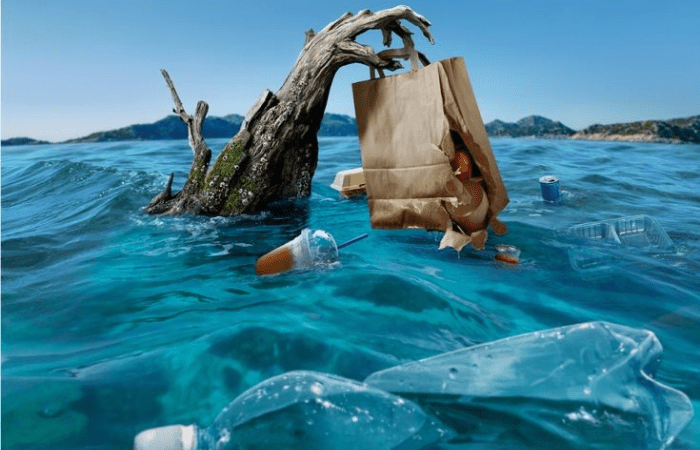Pollution by plastics is one of the biggest challenges to marine life [as we speak] today. Marine animals are suffering from death through ingestion and entanglement as more than millions of tons of plastic are dumped into the ocean annually. The good news is that in this case, all of us can take action against this crisis.
When participating in events such as Plastic-Free July, we are constantly encouraged to minimise our use of plastics and instead make the switch to more environmentally friendly items. Find out how plastic affects sea creatures and learn what you can do to reduce the harm to our oceans in this guide.
How Plastic Affects Marine Life
-
Ingestion
Some sea animals mistake plastic for food and ingest it. Sea turtles mistake plastic bags for jellyfish and ingest them, while seabirds feed on bottle caps and other tiny particles. Ingested plastic causes blockages, internal harm, or even starvation since it occupies the stomach without offering nutritional value. -
Entanglement
Plastic items such as nets rings from beer holders, and ropes endanger sea creatures. Entangled animals become weak, unable to swim, find food, or avoid predators, which often leads to their death. -
Habitat Destruction
Littering with plastics damages sensitive structures such as coral reefs. Plastics can smother corals, block sunlight, and release toxins into the water, negatively affecting marine life. -
Microplastics
Larger plastics degrade into microplastics, which pollute the food chain when ingested by animals. Nano-particles of these polymers have been found in fish, shellfish, and even the salt we use for seasoning, creating health risks for both marine creatures and humans.
Plastic-Free July
Plastic-Free July is an individual, business, and community challenge to voluntarily refrain from single-use plastics for one month and beyond. When you get involved, you will help reduce the use of plastics and contribute to a more positive future for marine life.
Steps You Can Take to Help
-
Reduce Single-Use Plastics
Around 32 percent of ocean plastic can be attributed to disposable products such as straws, bags, and bottles. Start your plastic-free journey by saying no to these items and opting for reusable alternatives, such as:
-
Stainless Steel Straws: A durable substitute for plastic straws.
-
Reusable Cloth Bags: Ideal for food shopping and other regular errands.
-
Glass or Stainless Steel Water Bottles: Replace single-use plastic bottles with long-lasting options.
-
Support Sustainable Products
Using green products not only helps you avoid plastics but also supports sustainable alternatives. Consider these options:
-
Beeswax Wraps for storing food
-
Coconut Fiber Scrubbers for cleaning
-
Bamboo Toothbrushes for dental care
-
Go for Beach Cleansing
Beach cleanups are effective for removing plastic waste before it enters the ocean. Plastic-Free July is observed through various events, making it a great time to participate. If you’re not near a beach, you can clean up parks, rivers, or other local areas to prevent plastics from entering waterways.
-
Educate and Advocate
Raise awareness about the effects of plastic on marine life. Support organisations, participate in campaigns against waste production, and advocate for stricter rules to reduce the use of non-recyclable products.
-
Recycle Responsibly
While reducing plastic use is the top priority, recycling remains crucial for managing waste. Learn what can and cannot be recycled in your area to avoid “wish-cycling” (incorrectly placing non-recyclables in recycling bins).
Organic Products to Promote the Campaign
To kickstart your journey, here are a few recommended plastic-free products:
-
Bamboo Cutlery Set – A compact and eco-friendly alternative to disposable utensils.
-
Stainless Steel Containers – Ideal for carrying packed meals without using plastic.
-
Plant-Based Dish Sponges – Biodegradable and environmentally friendly.
-
Beeswax Food Wraps – A reusable option for replacing plastic foil in the kitchen.
Check out these and other sustainable products at online stores like Brown Living to get items that promote such a lifestyle.
Ripple Effect of Your Choices
This means that by using less plastic, you directly help create a healthier ocean. Each time you decline a plastic bag, use reusable items, or pick up a piece of litter, it matters. Reducing plastic use isn’t just for individuals participating in Plastic-Free July; it’s for everyone and contributes to a plastic-free world.
Final Thoughts: Conservation of Marine Life Begins with You
Plastic pollution affects ocean life, but people can change the situation. The good news is that making small changes, such as using non-plastic alternatives and choosing sustainable products, supports marine life and helps preserve the oceans.
As we celebrate Plastic-Free July, let us pledge to reduce plastic consumption and protect our oceans. We owe it to ourselves and future generations to create a clean, healthy world where every small step counts.



Share:
Eco-Friendly Yoga Products for Beginners: What You Need to Get Started
The History of World Chocolate Day: How It All Began